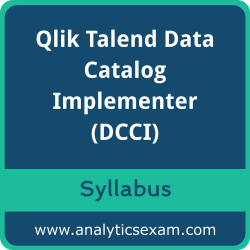 Welcome to your one-stop solution for all the information you need to excel in the Qlik Talend Data Catalog Implementer (DCCI) Certification exam. This page provides an in-depth overview of the Qlik DCCI Exam Summary, Syllabus Topics, and Sample Questions, designed to lay the foundation for your exam preparation. We aim to help you achieve your Qlik Talend Data Catalog Certified Implementer certification goals seamlessly. Our detailed syllabus outlines each topic covered in the exam, ensuring you focus on the areas that matter most. With our sample questions and practice exams, you can gauge your readiness and boost your confidence to take on the Qlik Talend Data Catalog Implementer exam.
Welcome to your one-stop solution for all the information you need to excel in the Qlik Talend Data Catalog Implementer (DCCI) Certification exam. This page provides an in-depth overview of the Qlik DCCI Exam Summary, Syllabus Topics, and Sample Questions, designed to lay the foundation for your exam preparation. We aim to help you achieve your Qlik Talend Data Catalog Certified Implementer certification goals seamlessly. Our detailed syllabus outlines each topic covered in the exam, ensuring you focus on the areas that matter most. With our sample questions and practice exams, you can gauge your readiness and boost your confidence to take on the Qlik Talend Data Catalog Implementer exam.
Why Qlik Talend Data Catalog Implementer Certification Matters
The Qlik DCCI exam is globally recognized for validating your knowledge and skills. With the Qlik Talend Data Catalog Certified Implementer credential, you stand out in a competitive job market and demonstrate your expertise to make significant contributions within your organization. The Qlik Talend Data Catalog Implementer Certification exam will test your proficiency in the various syllabus topics.
Qlik DCCI Exam Summary:
| Exam Name | Qlik Talend Data Catalog Implementer |
| Exam Code | DCCI |
| Exam Duration | 90 minutes |
| Exam Questions | 55 |
| Passing Score | 65% |
| Exam Price | $250 (USD) |
| Books / Training |
Talend Data Catalog User Guide Talend Data Catalog Getting Started Guide Talend Data Catalog Administration Guide Talend Data Catalog Bridges Talend Data Integration – Import Meta Integration Business Glossary (CSV) – Export |
| Exam Registration | Qlik |
| Sample Questions | Qlik Talend Data Catalog Implementer Certification Sample Question |
| Practice Exam | Qlik Talend Data Catalog Implementer Certification Practice Exam |
Qlik DCCI Exam Syllabus Topics:
| Objective | Details |
|---|---|
| Overview of Talend Data Catalog |
- Define Data Catalog - Define the Business Intelligence (BI) systems - Describe the data transformation processes (BI tools, ETL tools, on-premises databases, data stores, data marts, data warehouses, and data models) - Describe the architecture of Talend Data Catalog (Configuration and Diagram, including Remote Metadata Harvesting Agents) - Differentiate between data cataloging and metadata management |
| Managing user roles and tasks |
- Define object and global roles, users, groups, role-based access, and security privileges - Execute administration tasks (audit, operation logs, system logs, test performance, and user directories) - Manage configurations (build, backup, and publish) - Manage license updates and cumulative patches - Design and manage default dashboards, including customizing widgets |
| Harvesting metadata (configuring data models, bridges, profiling, data masking, automating, and versioning) |
- Differentiate between full and incremental harvesting - Use a bridge to collect metadata from a data source (data store, Data Integration (DI) tool, BI tool, or business application) - Harvest metadata (flat files, database schemas, DI Jobs, Tableau reports, and Qlik) - Perform data profiling, classification, labeling, and sampling, including incremental data profiling - Manage a metadata repository - Automate harvesting and versioning control |
| Stitching metadata and reports |
- Stitch objects together in a configuration to define the data flow - Build a configuration to connect models Document metadata objects using labels, comments, attachments, and custom attributes - Manage data connections and metadata stitching - Define Stitching Reports |
|
Model management (concepts, terms, definitions, custom attributes, and semantic types)
|
- Build a business glossary model, including bootstrapping a glossary - Import and export objects, terminologies, definitions, and relationships - Map a business glossary to another model - Build and populate a custom model, including importing and exporting metadata - Manage relationships in the catalog |
| Defining semantic lineage |
- Manage semantic mapping for semantic lineage and definition - Generate lineage reports - Use term documentation, inferred documentation, and mapping |
| Mapping, tracing, and analyzing data flow |
- Differentiate between the types of data mappings, including import, export, and forward engineering - Manage data mapping for data flow and impact analysis |
| Working collaboratively using social catalog and glossary workflow |
- Orchestrate data curation using social catalog (certifications, endorsements, warnings, watching, and notifications) - Manage workflow, including workflow tasks and publications - Perform advanced searches using specific parameters - Utilize worksheets (create, share, and manage default worksheets) |
| Managing metamodel and data modeling |
- Describe metamodeling concepts - Manage metamodels, including importing and exporting - Describe data modeling, including naming standards and versioning - Work with data models |
| Accessing Talend Data Catalog REST API |
- Use the REST API to run requests on the repository, glossaries, and users - Import and export data using the REST API |
| Managing data classes |
- Manage data classes, including importing and exporting - Describe data classification groups and classification process management |
The Qlik has created this credential to assess your knowledge and understanding in the specified areas through the DCCI certification exam. The Qlik Talend Data Catalog Certified Implementer exam holds significant value in the market due to the brand reputation of Qlik. We highly recommend thorough study and extensive practice to ensure you pass the Qlik Talend Data Catalog Implementer exam with confidence.
